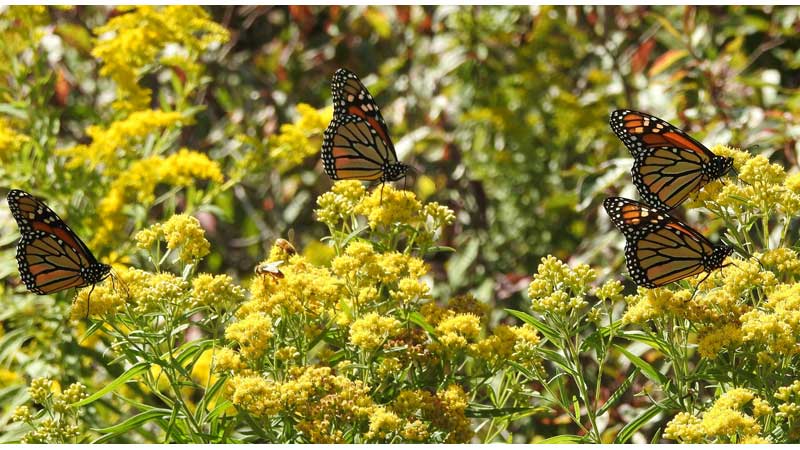🦋 Canada to Restore Lands to Enhance Monarch Butterfly Habitats
Monday, 27 March 2023 04:36.PM
- 407 ETR and the Canadian Wildlife Federation working to restore the equivalent of 22 football fields of land to enhance monarch butterfly and pollinator habitats along roadsides in the GTHA.
- With the growing urgency of the climate crisis, 407 ETR is putting a greater emphasis on biodiversity, and supporting organizations focused on enhancing and protecting Ontario's green spaces. -
407 ETR and Canadian Wildlife Federation (CWF) are teaming up to help bend the curve on biodiversity loss in Canada by restoring critical pollinator habitats for monarch butterflies, bees, hummingbirds and other pollinator species in municipalities surrounding the Highway 407 ETR corridor. 407 ETR's funding will support the restoration of 12 hectares – the equivalent of roughly 22 football fields – along the monarch butterfly migration route that closely follows the roadway of Highway 407 ETR.
"Human interventions have caused significant declines in pollinator populations across North America, and these species are critical for our ecosystems. A third of the food we eat is created by pollinators and they sustain so much of the native plants and habitats that we depend on," says Carolyn Callaghan, CWF's senior conservation biologist for terrestrial ecosystems. "The path we're on needs to improve and Corporate Canada plays a part in facilitating lasting, sustainable and meaningful change. We're excited to see organizations like 407 ETR partner with us to help halt and reverse the decline in biodiversity."
When conditions are suitable, the land area surrounding roadways, technically referred to as rights-of-way, can provide important habitat for monarch butterflies and other pollinators. "Biodiversity is critical for healthy ecosystems. The 108 kilometres that make up Highway 407 ETR are surrounded by native plants, wildlife and pollinator species that are essential to our daily lives," says Javier Tamargo, President & CEO at 407 ETR. "We want to be part of the solution and connect Ontario in a way that supports and benefits the natural environment. In addition to the work we're doing to reduce 407 ETR's environmental footprint, we're evaluating the establishment of a long-term biodiversity vision and action plan and investing in organizations protecting and improving Ontario's natural spaces."
Fast facts:
• 407 ETR is proud to embark on a three-year sponsorship with CWF to support their Rights-of-Way as Habitat Program
• Through CWF's work, rights-of-way managers and municipalities across the GTHA will receive technical education and learn about best practices in roadside vegetation management to help support the recovery of monarchs and benefit thousands of other pollinator species.
• Best practices include cleaning equipment regularly to minimize the inadvertent spreading of seeds of invasive species and reducing the frequency of mowing and herbicide.
• It takes roughly 3 years to observe the results of habitat restoration efforts
• There are an estimated 262,000 hectares of roadside in Ontario
• Insect abundance has declined by 50 to 90% in North America and Europe1
• 8 species of native bees are considered at risk in Canada2 and the population of the monarch butterfly has declined by 75% in North America
407 ETR continues to work towards its target of a 25 per cent reduction to greenhouse gas emissions3 by 2030 relative to the 2018 baseline. Learn more about the Company's environment, social and governance (ESG) at 407etr.com.
SOURCE: 407 ETR Concession Company Limited
- Related materials:
